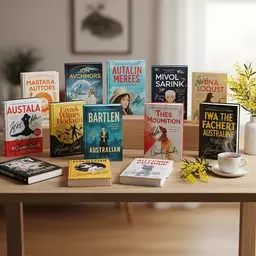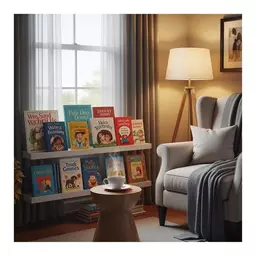Selecting Age-Appropriate Books Easily

What if the right book could unlock your child's imagination and build their future? Understanding age-appropriate literature is key to fueling that journey. Dive into the world of children's books to discover how to nurture a love of reading that lasts a lifetime.
What You Will Learn
- Choosing age-appropriate books enhances children's vocabulary and language skills.
- Books support emotional regulation and empathy through relatable themes.
- Reading aloud with varied techniques creates an immersive storytelling experience.
- Engaging in discussions about stories fosters critical thinking and emotional intelligence.
- Staying updated on children's literature trends enriches reading experiences.
- Community literacy initiatives offer valuable support and resources for young readers.
The Pillars of Children's Reading Development
Understanding the key stages and interactions that foster a child's love for reading.
Age-Appropriate Literature: Defining & Impact
Literature tailored to developmental stage in content & complexity.
- Enhances vocabulary & language
- Fosters critical thinking
- Supports emotional regulation
Fostering Reading Habits: Shared Experiences & Techniques
Key to nurturing lifelong love of books through interaction.
- Parent-child reading interactions
- Importance of repetition (familiar titles)
- Reading aloud techniques (tone, questions, props)
Current Trends & Support: Digital, Community, & Collaboration
Staying informed and leveraging resources for holistic development.
- Navigating banned books & representation
- Exploring digital & audiobook options
- Community literacy initiatives
- Parent-educator collaboration
Understanding the Importance of Age-Appropriate Books
As a passionate advocate for children's literature, I can’t stress enough the significance of selecting age-appropriate books for young readers. The right book can ignite a child's imagination and foster their love for reading. Each stage of development comes with its own unique set of needs and interests, making the selection process a vital aspect of nurturing young minds. To help you in this process, consider exploring guides on selecting age-appropriate books for kids.
When we choose books that align with a child's cognitive abilities and emotional growth, we are setting them up for success. Age-appropriate literature not only captivates their attention but also supports their overall development, providing them with stories that resonate and characters they can relate to.
Why Book Selection Matters for Development
- Enhances vocabulary and language skills
- Fosters critical thinking and comprehension
- Encourages empathy and understanding of different perspectives
- Supports emotional regulation through relatable themes
Each of these points highlights why paying attention to book selection is essential. By introducing children to stories that reflect their experiences and challenges, we create a safe space for them to explore complex emotions and ideas.
Connecting Reading to Cognitive and Emotional Growth
Books are more than just stories; they are tools for growth. Through reading, children develop cognitive skills such as problem-solving, memory, and attention span. With every turn of the page, they also navigate their emotions, learning how to express and understand feelings.

Encouraging conversations about the stories they read can further enhance these skills. Asking open-ended questions after a reading session, like “What did you think about the character's choices?” helps children articulate their thoughts and feelings, further stimulating their emotional intelligence.
Age-Appropriate Literature: Defining the Concept
So, what exactly do we mean by age-appropriate literature? This term refers to books that are tailored to a child's developmental stage in both content and complexity. It’s not just about the age written on the cover; it’s about the themes, language, and illustrations that connect with children at various ages.
- Infants: Board books with bright images and simple words
- Toddlers: Engaging stories with repetitive phrases
- Preschoolers: Colorful picture books that spark imagination
- Early readers: Simple texts that encourage independence
By understanding these layers of age-appropriate literature, we empower ourselves to make informed choices that nurture a child's love for reading. The journey begins with recognizing the importance of selecting books that resonate with their world.
Interactive Poll: Your Thoughts on Book Selection
We want to hear from you! How do you choose age-appropriate books for your child? Share your approach:
Fostering a Love of Reading Through Shared Experiences
As a passionate advocate for children's literature, I often reflect on the power of shared reading experiences. Encouraging parent-child reading interactions is key to nurturing a lifelong love of books. Imagine snuggling up with your child, turning the pages together, and immersing yourselves in vibrant stories! These moments not only strengthen your bond but also create a nurturing environment where reading becomes a cherished activity. For more insights on improving reading skills, check out tips to boost your child's reading skills.
When parents actively participate in reading, children are more likely to develop positive associations with books. It's essential to make this time enjoyable by picking stories that resonate with your child's interests. Don't shy away from using different voices for characters or incorporating fun sound effects to keep them engaged!
Understanding the Importance of Repetition and Familiar Titles
Have you noticed how children often want to read the same book over and over again? This repetition is not just a quirk; it's a vital part of their learning process. Familiar titles provide comfort and security, allowing children to explore language and storytelling without the challenge of new material. Each reading deepens their understanding and enhances their vocabulary.
- Reinforces language skills: Familiarity with words helps in quick recall.
- Boosts confidence: Mastery of a known story encourages them to take on new challenges.
- Encourages conversation: Repetition allows for discussion about the story and its characters.
Embrace your child’s love for certain books. You might even find joy in sharing your own favorite childhood stories, creating a bridge between generations!
Reading Aloud: Techniques for Enhanced Engagement
One of the most effective ways to foster a love of reading is through reading aloud. This practice transforms a simple book into an interactive adventure. I recommend varying your tone, volume, and pace to match the story's mood. For instance, use a soft voice when introducing a calm moment or a booming voice for exciting action scenes!

- Ask questions: Engage your child by pausing to ask what they think will happen next.
- Use gestures: Physical expressions can help convey emotions and actions within the story.
- Incorporate props: Bringing in related toys or pictures can enhance the experience.
By implementing these techniques, you're not just reading—you’re creating an immersive storytelling experience that captivates young minds!
Staying Informed on Current Trends in Children’s Literature
As we dive deeper into fostering a love for reading, it’s also crucial to stay informed about current trends in children’s literature. The world of books is always evolving, and so are the themes and topics that resonate with young readers. For instance, navigating discussions around banned books and representation can greatly impact our children's understanding of the world.
Navigating Topics Like Banned Books and Representation
Discussing banned books with your kids can open up important dialogues about freedom, expression, and the value of diverse perspectives. By introducing them to a variety of authors and stories, you help cultivate empathy and understanding. This approach not only broadens their literary horizons but also encourages critical thinking about societal issues.
Exploring Digital and Audiobook Options for All Ages
In our modern world, digital and audiobook formats have become increasingly accessible. Exploring these options can provide children with new ways to engage with stories. Audiobooks are fantastic for long car rides or as a calming bedtime routine. They introduce children to different accents, storytelling techniques, and even sound effects that enhance the narrative experience!
Community Literacy Initiatives and Their Impact on Reading
Lastly, community literacy initiatives play a significant role in enriching our children's reading experiences. Local libraries often host reading programs that not only provide access to books but also encourage community engagement. Participating in these initiatives can be a wonderful way to support young readers and give them opportunities to connect with others who share their love for literature. You can also discover more about various authors through author spotlights on Australian authors for young readers.
Conclusion: Partnering for Effective Book Selection
As we wrap up this exploration of fostering a love for reading, it’s clear that collaboration between parents and educators is vital for better outcomes. When we come together, we can create a supportive environment that encourages children to discover the magic of books!
Collaboration Between Parents and Educators for Better Outcomes
Working in partnership allows for a more rounded approach to book selection. Share insights about your child’s preferences with teachers or librarians, and don’t hesitate to ask for recommendations that align with your child's interests and reading level. This collaborative effort can lead to exciting discoveries!
Encouragement to Utilize Resources and Community Support
Finally, I encourage you to utilize resources like Kids Book Guide as a trusted platform for discovering engaging literature. Whether it’s through age-appropriate recommendations or author spotlights, we’re here to support you on this journey. Together, let’s inspire a love of reading that lasts a lifetime!
Frequently Asked Questions
- What does "age-appropriate literature" mean?
- Age-appropriate literature refers to books tailored to a child's developmental stage in terms of content, complexity, themes, language, and illustrations, ensuring they resonate with children at various ages.
- Why is selecting age-appropriate books important for children's development?
- Selecting age-appropriate books enhances vocabulary and language skills, fosters critical thinking, encourages empathy, and supports emotional regulation through relatable themes and characters.
- How can parents foster a love of reading in their children?
- Parents can foster a love of reading through shared reading experiences, encouraging repetition of familiar titles, and using engaging reading aloud techniques like varying tone, asking questions, and incorporating props.
- What role does repetition play in a child's reading development?
- Repetition of familiar titles reinforces language skills, boosts confidence in young readers, and encourages conversation about the story and its characters, making it a vital part of the learning process.
- How can parents stay informed about current trends in children's literature?
- Parents can stay informed by exploring diverse authors and stories, navigating discussions around topics like banned books and representation, and utilizing digital and audiobook options. Community literacy initiatives and collaboration with educators also provide valuable insights.
Recap of Key Points
Here is a quick recap of the important points discussed in the article:
- Selecting age-appropriate books is crucial for igniting a child's imagination and supporting their overall development.
- Books enhance vocabulary, foster critical thinking, and encourage empathy by reflecting experiences relevant to children.
- Repetition of familiar titles aids in language development and boosts children's confidence in reading.
- Reading aloud with varied techniques enhances engagement, making stories interactive and captivating.
- Staying informed on current trends in children's literature helps parents introduce diverse perspectives and discussion topics.
- Community literacy initiatives provide valuable support and resources for young readers.
Popular Posts
 As you navigate the vibrant world of children's literature, think about how a simple signature can t
As you navigate the vibrant world of children's literature, think about how a simple signature can t
 What if the right book could unlock your child's imagination and build their future? Understanding a
What if the right book could unlock your child's imagination and build their future? Understanding a
 Reading stories isn't just a pastime; it's a powerful catalyst for children's education. Australian
Reading stories isn't just a pastime; it's a powerful catalyst for children's education. Australian
 In the words of Aveline Carter, "The journey of discovering books can be just as exciting as reading
In the words of Aveline Carter, "The journey of discovering books can be just as exciting as reading
